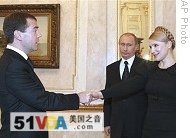Washington
29 January 2009
 |
| Russian President Dmitri Medvedev (L) greets Ukrainian PM Yulia Tymoshenko as Russian PM Vladimir Putin looks on, 17 Jan 2009 |
Many analysts say you can look at a calendar and almost predict the next crisis between Russia and Ukraine: if it is January, there is a good chance you will see both countries embroiled in a dispute over the delivery of natural gas.
On January 1, Russia stopped selling gas to Ukraine over a price dispute. It then accused Ukraine of siphoning off natural gas bound for Europe - and turned off the taps entirely on January 7. Ukrainian President Viktor Yushchenko dismissed Moscow's claims.
The dispute was finally settled January 19 - but not before gas supplies to 18 European countries were severely disrupted during one of the coldest winters in years.
Europe receives about a quarter of its natural gas through Gazprom, the Russian gas monopoly. Eighty percent of the gas it ships West passes through the same pipelines that supply Ukraine. Countries such as Finland, Hungary, Slovakia, Macedonia, Bulgaria, Lithuania, Estonia and Latvia were severely affected, since they rely on Russia for nearly all their gas.
The first crisis pitting Ukraine and Russia over deliveries of natural gas occurred in January 2006. At that time, the disruptions to Europe were minimal and the dispute was settled in three days.
Katinka Barysch, from the London-based Center for European Reform, says the political climate was different three years ago.
"In 2006, when the Russians first cut off the gas to Ukraine, the Europeans almost automatically blamed the Russians," said Barysch. "The [2004] "Orange Revolution", the democratic revolution in Ukraine, was still relatively fresh in our memories. The leadership that came out of that 'Orange Revolution" with President Yushchenko and Prime Minister [Yulia] Tymoshenko had the goodwill of the Europeans because they were seen as pro-democratic forces that would take the country into the right direction."
But Barysch says that did not happen.
"In the last three years, these political leaders have turned out to be a squabbling and self-serving lot that have not actually done very much for the good of the country," she said. "It seems, sometimes, that they only exist for their own good. Sort of murky stories have emerged with Ukrainian politicians having close links to oligarchs who themselves benefit from the gas trade. So because Ukraine has not made much headway, it has kind of lost the goodwill of the Europeans - so automatically, no longer the blame goes to Russia alone. The Europeans initially sat back and said, 'go sort it out, that is not our problem.' Then as the gas got shut off, they were knocking heads together - but they were not automatically saying it is the Russians' fault. Neither country has any credibility at the moment."
Robert Legvold from Columbia University says even in Soviet times, gas deliveries were on time.
"Historically, first the Soviets and subsequently the Russians have said, 'We have always, historically, back in the Cold War days, been reliable suppliers'. And for the most part, the Europeans bought that argument," he said. "Even during difficult moments like the Afghan War in the Soviet period post-1979, the gas flowed reliably. Now suddenly, in this new period, in three different instances - oil with Belarus and twice now gas with Ukrainians - things get cut off."
In this latest crisis, Ukraine and Russia reached a pricing agreement good for 10 years. Officials from both countries said that pact shows Moscow and Kyiv can be reliable gas suppliers for a long period of time.
But many analysts, including Marshall Goldman from Harvard University, express doubt.
"If you have got leaders who are antagonistic to each other and want to prove a point, then there is no guarantee that it will be observed and that there will not be similar problems in the future," he said. "I would be surprised if for the next 10 years there is no tension and that everything worked out harmoniously."
Goldman and others say this latest crisis proves how important it is for Europe to reduce its dependence on natural gas supplies from Russia. Analysts say it is essential for Europe to find alternative sources of energy - as quickly as possible.